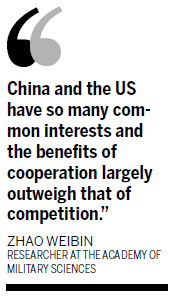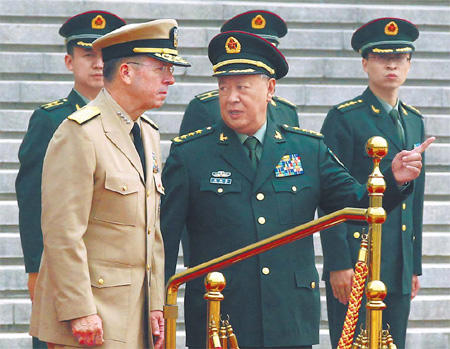China-US
US joint sea drills criticized
Updated: 2011-07-12 07:05
By Li Xiaokun and Li Lianxing (China Daily)
|
General Chen Bingde, chief of the general staff of the People's Liberation Army, greets Admiral Mike Mullen, chairman of the US Joint Chiefs of Staff, at a welcome ceremony on Monday at army headquarters in Beijing. The meeting between the top military officers, the first in Beijing for four years, aims to improve military relations amid tension in the South China Sea. Wu Zhiyi / China Daily |

Chen raises concerns over Washington's China policies
BEIJING - A top Chinese military officer on Monday criticized the United States for conducting joint drills in the South China Sea recently, saying the timing was "inappropriate".
"On various occasions, the US has expressed that it does not intend to intervene in South China Sea disputes," General Chen Bingde, chief of the general staff of the People's Liberation Army, said.
"The US is actually sending out the opposite signal," Chen said.
"We have observed the latest joint exercises between the US and other countries, for example, the Philippines and Vietnam."
Chen was speaking at a news conference after holding talks with Admiral Mike Mullen, chairman of the US Joint Chiefs of Staff, who is on a four-day reciprocal visit to China after Chen's trip to the US in May.
Mullen said that the US will maintain its presence in the South China Sea.
The US, Japan and Australia held a joint military exercise in waters near the South China Sea on Saturday, the first of its kind in the area.
The Philippines conducted an 11-day naval exercise with the US close to the South China Sea, which ended on Friday, while Vietnam and the US are scheduled to hold joint naval drills later this month.
Several Asia Pacific nations, including Vietnam and the Philippines, have competing sovereignty claims over the South China Sea, which, historically, has been Chinese territory.
Territorial spats have flared up in the past several months and China has called for the disputes to be resolved bilaterally through peaceful means.
"The timing of these joint exercises is inappropriate, as we see it," Chen said.
Chen also complained about other US moves that have irritated China, such as US planes and warships continuously engaged in spying activities off China's coast and the meeting between several US politicians, including House Democratic leader Nancy Pelosi, with the Dalai Lama in Washington last week.
"US unmanned aircraft have conducted reconnaissance only 16 nautical miles from China's border. This is very, very close. I hope our American friends can adopt measures in this regard that will fully consider the feelings of the Chinese people," Chen said.
Mullen acknowledged tough challenges to improving military ties and called for more communication as well as "clearer and more pragmatic expectations".
"We need to continue to work toward an understanding as these differences continue to be out there," Mullen said. "That's why it's so important that we have a robust military-to-military relationship."
Chen also said that the US is spending too much on its military in light of its recent economic troubles.
"I know the US is still recovering from the financial crisis," Chen said. "Under such circumstances, it is still spending a lot of money on its military and isn't that placing too much pressure on the taxpayers?"
China's military budget remained at $95 billion this year, while Washington planned $650 billion in defense spending, according to official figures.
Mullen received a high-level reception in Beijing.
On Sunday, he was shown around the Second Artillery Force Headquarters, a strategic missile force that controls the country's nuclear weapons.
"This is an opportunity for communication," Zhao Weibin, a researcher at the Academy of Military Sciences under the PLA, said.
"China and the US have so many common interests and the benefits of cooperation largely outweigh that of competition. A stable East Asia serves the interests of both."
Meng Xiangqing, a professor with the National Defense University, said Sino-US military ties reflect the complexity of the relationship between China and the US.
The US needs to cooperate with China to recover from the financial crisis, while its interests in East Asia require policies that will restrain China. This situation will remain for the foreseeable future, he said.
"Such policies include arms sales to Taiwan and strengthening links with Japan, Australia and Southeastern Asian countries," he added.
Mullen also met Vice-President Xi Jinping on Monday and several high-ranking military officials. He is scheduled to visit army, navy and air force units in Shandong and Zhejiang provinces before leaving for South Korea and Japan on Wednesday.
Reuters and AP contributed to this story.
China Daily
(China Daily 07/12/2011 page1)

Specials

90th anniversary of the CPC
The Party has been leading the country and people to prosperity.

The write stuff
'Pen capital' goes back to drawing board for answers to economic changes taking shape in Zhejiang

Say hello to hi panda
An unusual panda is the rising star in Europe's fashion circles
